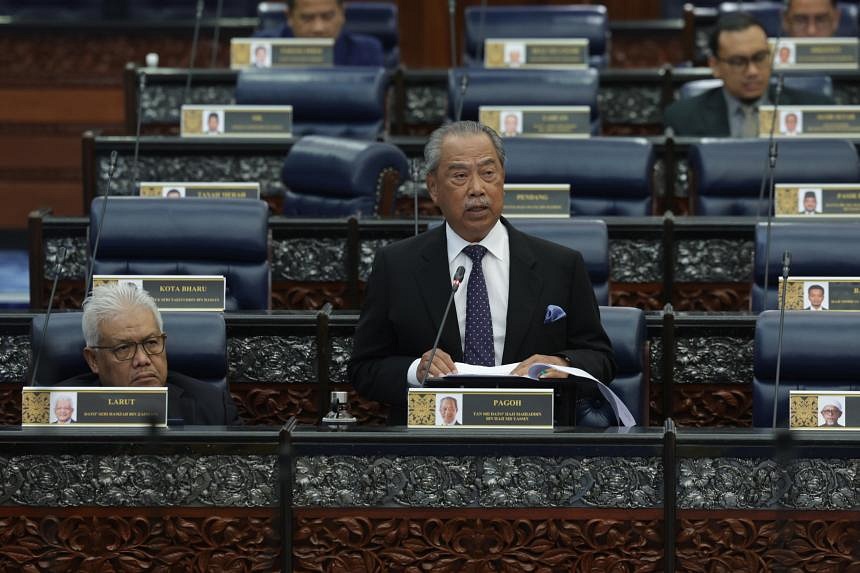KUALA LUMPUR - Claims that a top Parti Pribumi Bersatu Malaysia leader has often been seen at Prime Minister Anwar Ibrahim’s office recently is the latest in a series of destabilising developments that calls into question the long-term viability of the opposition party.
The party, which was formed in 2016 as a direct response to the 1Malaysia Development Berhad (1MDB) scandal engulfing then Premier Najib Razak, took power in 2018 when its then chairman Mahathir Mohamad was sworn in as prime minister following the Pakatan Harapan (PH) coalition’s election victory.
He was succeeded by Bersatu’s president Muhyiddin Yassin in 2020 after the majority of its leadership decided to partner other Malay-Muslim parties in a bid to stem ebbing support from Malaysia’s majority community, leading to the break-up of the PH government.
But despite a credible performance in winning 31 parliamentary seats at the November 2022 General Election – more than doubling its 2018 haul – Bersatu has struggled in opposition. Six of its MPs have pledged support to the Anwar administration in exchange for millions in constituency funding, amid claims the number of rebels will soar into the double digits soon.
The government’s decision not to abide by PH’s election pledge to hand all MPs equal funding, be they part of the ruling coalition or the opposition, has further exacerbated Bersatu’s financial problems, after its accounts were controversially seized by graft busters in early 2023.
Talk of a senior Bersatu official negotiating with the Premier “for survival” of his faction has made the rounds since early February, deepening suspicion and mistrust within the party. Checks by The Straits Times, however, raise doubt over the veracity of these rumours, which appear to have been stoked for political purposes.
In addition, a feud has intensified within the party over a planned leadership transition before the next general election, which is due by early 2028. How this fight pans out becomes even more crucial for the fortunes of the party that is the linchpin of the main opposition pact Perikatan Nasional (PN).
Top party sources told ST that a longstanding rivalry between secretary-general Hamzah Zainudin and his supporters and a camp surrounding Muhyiddin is coming to a head with party polls expected in late 2024, leaving Bersatu “ablaze with strife”.
“Muhyiddin is not taking sides, but he is wary of Hamzah who has been positioning himself as PN’s prime minister candidate ever since taking up the position as parliamentary opposition leader,” one official said.
Insiders have noted that several recent party appointments, including to the powerful disciplinary board, have all been from the ranks of supporters of its Selangor chief Azmin Ali – Muhyiddin’s right-hand man when they were in Cabinet – and deputy president Faizal Azumu, both of whom are against Datuk Seri Hamzah exerting wider influence in the party.
Supreme council member Wan Saiful Wan Jan told ST that “we cannot pretend that the perception of a rivalry isn’t widespread, but healthy competition for positions is normal in all parties”.
“What we want to avoid is unhealthy division. I am sure everything will be sorted out at the party election, but even before that we are holding a retreat this weekend (Feb 24 to 25) where we will work on political strategies and also resolve any internal administrative issues,” said the party’s training chief who is organising the retreat.
Muhyiddin made an about-face at November’s national party assembly, first declaring he would not defend the presidency and the next day saying he would stay another term based on the wishes of Bersatu members.
But the former premier – who, along with several family members, is facing graft charges that he claims are politically motivated – is planning to step down midway through the three-year term, according to people who attended a January supreme council meeting where he made the announcement.
“I can’t stay on for too long and I believe it is time for new leadership to take over. I think in the next one or two years,” he said in an interview with Sinar Harian published on Feb 18.
However, Bersatu’s Constitution dictates that only a member who has served in leadership for two terms can contest the presidency, deputy presidency or the three vice-presidencies. Only five members of the existing supreme council qualify. This group does not include Datuk Seri Azmin or Mr Hamzah, both of whom joined the top decision-making body only during the existing term in 2020.
It is expected that the rules will be loosened by either a supreme council decision or a party-wide resolution. But the parameters could lead to further intrigue, as whoever is deputy president would ostensibly be acting president when Muhyiddin steps down and become a front runner to be Bersatu’s PM candidate at the next general election.
Talk is also growing that Mr Hamzah may be removed as secretary-general. But sources say Muhyiddin will stop short of appointing Mr Azmin, so as not to be seen to be giving any side the advantage leading into the party polls.
While Datuk Seri Anwar’s near-term grip on power may be strengthened by an imploding Bersatu, analysts believe this will lead to its PN partner Parti Islam SeMalaysia (PAS) – already the largest party in Parliament with 43 MPs – taking on a more dominant role by the time the next general election rolls around.
BowerGroupAsia political analyst Adib Zalkapli told ST: “PAS is the party seen to be adding more value to PN. Even if Bersatu is decimated by the next polls, PAS will simply fill the void and take over these Malay-majority seats, or even more if Malay support continues to swing their way as it has in the past year.”
This could lead to PH facing a similar situation as in 2018, when the party seen to be the voice of Malay-Muslims – then Umno, which is now a minority partner in the Anwar government – was not in power, fuelling the perception that the community was being sidelined.
Singapore Institute of International Affairs’ senior fellow Oh Ei Sun finds the defection of Bersatu MPs to support the government “eerily reminiscent” of the state of play just before Muhyiddin took power in February 2020, as Umno lawmakers who had crossed the aisle to support PH flipped again to follow a new leader out of PH.
“PAS is making substantive preparation to go from a regional powerhouse in the north to taking over the federal government, such as with Terengganu Chief Minister Samsuri Mokhtar’s whopping win in Kemaman, giving them a potential prime ministerial candidate,” he told ST.
Both PAS president Hadi Awang and his deputy Tuan Ibrahim Tuan Man are widely viewed as Islamic leaders rather than policymakers, but vice-president Samsuri’s presence in Parliament gives the Islamist party a technocrat at federal level.


